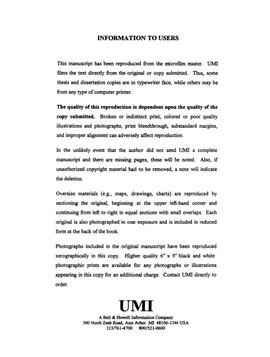| dc.contributor.advisor | Hertzke, Allen, | en_US |
| dc.contributor.author | Laplant, James Thomas. | en_US |
| dc.date.accessioned | 2013-08-16T12:30:01Z | |
| dc.date.available | 2013-08-16T12:30:01Z | |
| dc.date.issued | 1998 | en_US |
| dc.identifier.uri | https://hdl.handle.net/11244/5632 | |
| dc.description.abstract | The results of this study of 942 middle school students in the Oklahoma City Public Schools reveal that family discussions of politics and group membership provide a pull into the world of politics for many adolescents. Adolescents who are being raised in families that frequently discuss politics are more likely to identify with a political party than students who do not discuss politics in their home. Group membership has a positive impact on citizenship awareness, political interest, political efficacy and political knowledge. In support of Merelman's lateral theory of socialization, the results of the Oklahoma City survey not only confirm the important role of group membership and television viewing in adolescent political socialization, they also reveal the varying images of society that are delivered to teenagers. Television viewing has a deleterious impact on citizenship awareness, social trust, political efficacy and political interest, while membership in school and after-school groups has a positive influence on all four factors. | en_US |
| dc.description.abstract | The major studies of political socialization are now fifteen to thirty years old. The social world has changed dramatically for adolescents over the past thirty years. Teenagers in the 1990s must confront family disruption, poverty, crumbling schools, the pervasive influence of television and the unraveling of community networks. This research project is driven by the central concern with how the social environment provides a "pull" in the political socialization process. Based upon Merelman's (1986, 307) lateral theory of socialization, this study explores the horizontally connected agents of socialization that "compete with one another to reach the young and, in the process, deliver quite varying images of society." | en_US |
| dc.description.abstract | Since 37 percent of the students in this sample are African-American, this study provides a detailed analysis of racial differences in political socialization. Black students are more likely to perceive high levels of discrimination in society than white students. Heavy television viewing is associated with a preference for school and neighborhood segregation among both black and white students. Almost half of the white and black middle school students believe that race relations will get worse in the future. | en_US |
| dc.format.extent | viii, 285 leaves : | en_US |
| dc.subject | Television and teenagers. | en_US |
| dc.subject | Political Science, General. | en_US |
| dc.subject | Education, Secondary. | en_US |
| dc.subject | Political socialization. | en_US |
| dc.subject | Teenagers Oklahoma Oklahoma City Attitudes. | en_US |
| dc.subject | Political socialization Oklahoma Oklahoma City. | en_US |
| dc.title | Political learning in adolescence: A survey of political awareness and attitudes of middle school students in the heartland. | en_US |
| dc.type | Thesis | en_US |
| dc.thesis.degree | Ph.D. | en_US |
| dc.thesis.degreeDiscipline | Department of Political Science | en_US |
| dc.note | Adviser: Allen Hertzke. | en_US |
| dc.note | Source: Dissertation Abstracts International, Volume: 59-04, Section: A, page: 1321. | en_US |
| ou.identifier | (UMI)AAI9828785 | en_US |
| ou.group | College of Arts and Sciences::Department of Political Science | |
